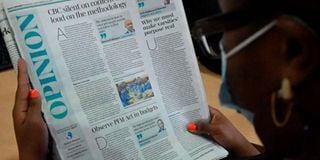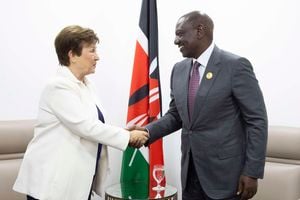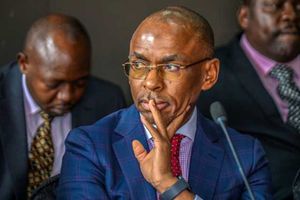When naming, shaming should not be done and other stories of the moment

A newspaper fan reads the Opinion section of the ‘Daily Nation’.
What you need to know:
- We did not name the plagiarist because, in ethical journalism, we try to minimise harm to the people we report about.
- Baraza JM left more or less of his own volition for reasons that have nothing to do with plagiarism.
Harrison Kinyanjui writes to say, correctly, that it’s customary and courteous for newspapers to inform readers of changes to their favourite columns. “Only recently, I read of the exit of columnist Mariga Thoithi, he of the “ManTalk” column in the Saturday Nation. After failing to read Baraza JM on two consecutive Wednesdays, I concluded that I might have missed the memo on his new abode, in case he has bolted. Do we have a new ‘Baraza’ yet?”
Carlos Kamau also asks why we did not name a columnist who was detected by a reader as having plagiarised some of his articles and was subsequently discontinued (See “Why plagiarism in journalism is a sin which cannot be washed away”, Daily Nation, February 25, 2022).
“Now, being in the business of poking its nose in everyone’s business, why doesn’t the Nation lead from the front and publish the names (of plagiarists)?” he asks while correctly guessing who the columnist was. “The reason I inquire is that I don’t want to believe the other was Baraza JM, my go-to for all of 10 years, but who nevertheless disappeared at the same time.”
Mr Baraza left more or less of his own volition for reasons that have nothing to do with plagiarism. He was a good creative writer.
We did not name the plagiarist because, in ethical journalism, we try to minimise harm to the people we report about. Naming — and therefore publicly shaming — him was not necessary, nor would it have improved or advanced my story, which was essentially not about him but the dangers of plagiarism.
The lesson here is that journalists should always balance the public’s need to know against the potential harm or discomfort they may cause the subject they write about.
***
Many readers liked the Nation headline “Do they even care? (Daily Nation, March 25, 2022). Short, crisp and to the point. The kind of headline that editorialises the news it covers.
“It’s a plea to our government leaders and those seeking leadership ranks that they should have a mindful heart about the common mwananchi who sacrifices his or her own time to attend rallies and vote for them,” Jonathan Salasya writes. “They should restrategise priorities and save the lives of those dying of hunger.”
Ulf Aschan says it was the best headline. “This is exactly what we all are asking: Do they even care? Kenya is suffering a monumental humanitarian crisis and all our leaders can think of is strutting around the country in their helicopters trying to gather votes.”
George Michuki says it was spot-on and made him proud of his newspaper of choice. “It made me think of the faces and effort behind what we read. Well done, Sila Kiplagat and Florah Koech and others who were involved in the writing of that piece and speaking for many who are so helpless in the face of adversity... I congratulate the Daily Nation for standing up for what is right and being on the right side of history — putting the public interest at the heart of journalism.”
***
Some readers were upset by Prof Makau Mutua’s latest opinion article (“Why William Ruto is totally unfit to be President of Kenya”, Sunday Nation, March 27, 2022). John Mukiri says readers who support the “Hustler Nation” are not happy. “Please save us from more of such columns,” he writes.
Former Nation journalist Mohamed Warsama says the Nation should cease Makau Mutua’s obsessive articles on Deputy President William Ruto: “There is nothing new he can tell us about Ruto that he hasn’t penned every weekend over the years.” He suggests that the full-page opinion should have been a sponsored content page (advertisement).
Unlike in Prof Mutua’s past articles about the DP, this time there was full disclosure. The credentials at the bottom of the article said, after his academic titles, that he is the “Spokesperson of the Raila Odinga Presidential Campaign Secretariat and head of its think tank”. Maybe that line should have come first in the order of the credentials. Affiliations can sometimes be more meaningful than academic titles in helping a reader to assess the credibility of a writer.
The Public Editor is an independent news ombudsman who handles readers’ complaints on editorial matters including accuracy and journalistic standards. Email: [email protected]. Call or text 0721989264





